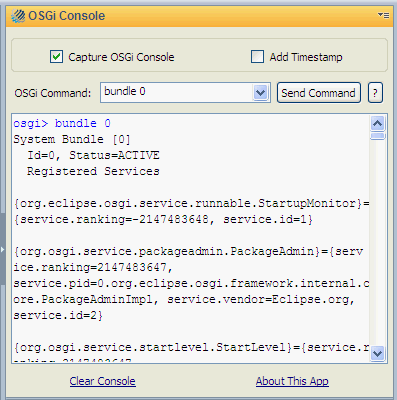Today, I procrastinated from Lotusphere responsibilities and "real work" by packaging up a sidebar app that's been pretty helpful for me in Lotus Notes plugin development. Freshly uploaded to the SNAPPS Widget Catalog is:

It's a plugin that allows you to send commands to the OSGi console and view the results. It will also display much of the System.out and System.err output that gets sent to the OSGi console by other plugins. Normally you do this by starting the Notes client with the RPARAMS -console launch option, but this way you don't have to worry about that.
I have a feeling there are probably less than 10 people in the whole world who will find this to be useful, but if you're one of that small group... enjoy!
I've been remiss in "announcing" my Lotusphere session, so if you haven't checked out the schedule using
Ben Langhinrichs' Sessions Database yet (or if you just passed right by it), my session is
BP206: Working with Feeds in IBM Lotus Notes and Domino, Tuesday at 10am.
One of the initial questions I got about the session when I was putting the abstract together was: "Can you really talk for an hour about feeds?"
After working through the slides and slaving over the demo database for 2 months, my answer is: "I don't think an hour will be long enough."
This is definitely a developer session, and I actually whiz through the "This is RSS", "This is Atom", etc. part of the discussion very quickly in the beginning so that we can really dig into how you need to code this stuff. The demo database has a ton of examples, and there might even be an OpenNTF project that sprouts out of it (haven't decided how far I want to go with it yet).
So no, it's not going to be a long boring ramble about the difference between RSS and Atom, it's a discussion about how to make Notes and Domino play in a feed-rich world. And code!
On
Chris Miller's monthly
SysAdmin Newsletter, there is a question about how to open links from Lotus Notes sidebar apps using the default browser instead of the Notes embedded browser.
While I haven't researched the behavior at all, I do know that there is an small, easy-to-use (and public domain) Java class called Bare Bones Browser Launch that works well in Java agents for opening hyperlinks in the default browser. I imagine it would work in a sidebar plugin as well.
UPDATE: in the comments, Tom Parsons from IBM suggests you can also use the Expeditor BrowserLauncher launchURLasExternal() method to do this (not sure it works in agents, but definitely in plugins). Thanks Tim!
